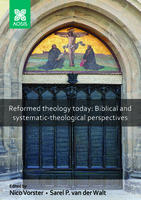Reformed theology today
Biblical and systematic-theological perspectives
Contributor(s)
P. Van der Walt, Sarel (editor)
Vorster, Nico (editor)
Language
EnglishAbstract
This book contributes to an extensive number of scholarly works produced in 2017 which commemorate the scientific revolution and paradigm shift that occurred in 1517. The year 2017 marks the 500th celebration of the Reformation actuated by Martin Luther when he published what later became known as the Ninety-Five Theses on indulgences. The Reformation was a religious, social, cultural and political event that reshaped the landscape of modern Europe and has had an influence on parts of the world far beyond. This includes the ‘far South’ such as South Africa where the legacy of the Reformers has moulded institutional and individual lives across boundaries of ethnicity and beliefs. Worldwide celebrations of this quincentenary anniversary provide scholars with an opportunity to reflect anew on the consequences and lasting import of the Reformation. This book provides one such a platform by discussing the scientific relevance of Reformed theology, specifically with regard to biblical, historical and systematic-theological themes. Comprising a collection of essays by scholars belonging to the Reformed tradition, it aims at examining the historical heritage of the Reformation, the current state of discourse in Reformed theology as well as the contemporary relevance of a Reformed approach to theology. It contains biblical, historical-theological and systematic-theological perspectives and addresses a variety of issues such as biblical interpretation, text-criticism, translation, constructive impulses emanating from classical Reformed thought, Christian freedom, anthropology and dialogue with non-Reformed traditions. Although the approaches followed are by no means exhaustive, they do provide the reader with some indication of approaches followed in Reformed discourse. Chapters 1–4 pertain to biblical interpretation. A variety of methods are discussed and employed, namely the grammatical-historical, text-immanent, socio-historical, redactional-historical, diachronic and synchronic approaches. These analyses confirm that biblical interpretation requires a multi-faceted approach to biblical texts. Chapters 5–9, conversely, discuss various historical and systematic-theological themes. Classical texts from the Reformation, specifically works by Calvin and Luther, are examined, and contemporary theological literature are analysed, compared and evaluated while innovative new ideas are proposed. This book is written in the reformed spirit of semper Reformanda. While it enters into dialogue with other traditions such as Pentecostal, Neo-Pentecostal, Roman Catholic and Lutheran theology, it also exhibits an attitude of self-reflection and self-correction. This contribution does not only affirm the Reformed heritage as a living tradition, but it also attempts to invigorate the tradition with innovating new ideas by drawing on classical and recent theological literature. The target audience is mainly Reformed theologians, but non- Reformed scholars, who are interested in engaging with the Reformed tradition, would find this book informative.
Keywords
scripture; historical; theology; christian; freedom; daniel; human; bible; catholic; christ; luther; reformed; reformation; calvin; testament; Anabaptism; Book of Daniel; Exegesis; God; John Calvin; Martin Luther; Religious textDOI
10.4102/aosis.2017.rtt146OCN
1030819852Publisher
AOSISPublisher website
https://books.aosis.co.za/index.php/obPublication date and place
Durbanville, 2017Imprint
AOSISClassification
Religion and beliefs


 Download
Download Web Shop
Web Shop